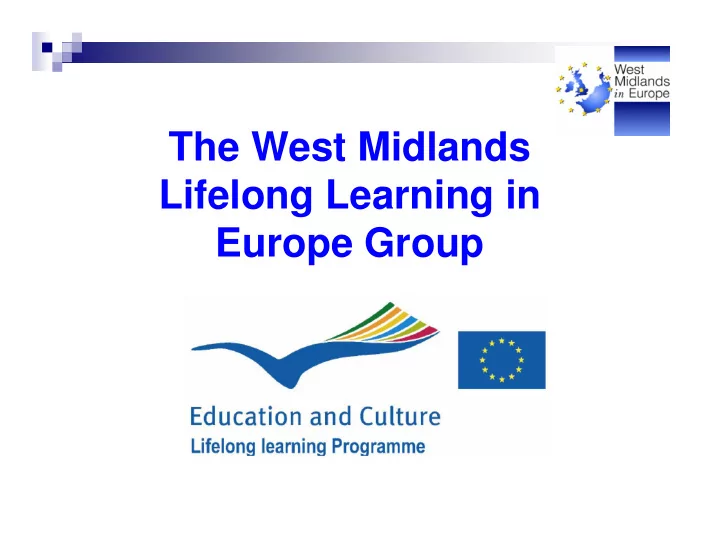

The West Midlands Lifelong Learning in Europe Group
EUebm Unity Project Julie Hadley Birmingham Women’s Hospital The University of Birmingham
� The Birmingham Women's HealthCare NHS Trust is one of only two trusts in the United Kingdom offering specialist care to women. The Trust provides a range of health care services to women and men across the West Midlands and beyond. � The trust has 142 adult beds and 43 neonatal cots and an annual income of £67.5 million. On average the Trust looks after 50,000 patients a year, carries out over 3,000 operations and more than 6,900 babies were delivered in 2005/06.
The University of Birmingham � The University of Birmingham is a leading research university and is one of the few Jean Monet European centres of excellence by the European Commission, in recognition of interdisciplinary expertise in European Affairs. � The University has over 9,000 new students every year and has a wide ranges of courses, with nearly 500 undergraduate programmes, and more than 320 postgraduate taught programmes. The University also attracts a diverse academic community, which includes over 4,000 international students from 150 countries.
Leonardo da Vinci Project � Project funded by Leonardo da Vinci national agency - ECOTEC � Duration: 24 months � Funding: 396,434 euros � Commenced: November 2005
Background � Evidence based medicine (EBM) refers to the integration of current best patient-centred research into clinical decision making. � Acquisition of knowledge and skills for EBM is becoming a core competence to be acquired by all doctors. � However, EBM is not uniformly taught as part of postgraduate medical education in the UK or Europe.
Overall aim of the project � The project aims to improve transparency across the European healthcare sector through the design, development, promotion and piloting of a European qualification in EBM for individuals with a medical or related degree.
Objectives � Evaluate teaching methods of EBM in each country � Map current medical training at foundation level in each country � Develop core curriculum and adapt to each country � Pilot and evaluate the EBM course in each country � Accredit the course in each country � Project website: www.ebm-unity.org � Further grant applications for dissemination and evaluation of the courses developed
Partners � The EU EBM Unity project is being developed in partnership with hospitals, universities and other academic institutions, doctors, trade unions and bodies at European level in eight different member states.
Partners � Nine partners: � Birmingham Women’s Hospital /The University Of Birmingham � Aquamed – Germany/Austria � Universita Cattolica del Sacro Cuore - Italy � Centre Reproductive Medicie - Amsterdam � CASPin – University of Birmingham � CASP Poland � CASP Spain � CASP Hungary � Switzerland � Steering Committee
Expected Outcomes � To develop a integrated European qualification in EBM � To improve the relevance and quality of medical training in Europe � To enable doctors to easily integrate into the healthcare systems of other member states � To improve mobility and effectiveness of doctors throughout Europe � To improve care of European patients
Methods � To develop a integrated European qualification in EBM
Methods � The project will develop an EBM curriculum that is integrated into clinical practice. � E-learning combined with conventional lectures. � Educationally sound methods � Mapping of learning needs � Explicit learning objectives � Appropriate teaching and learning method � Assessment matched with objectives
Future steps � Teaching the teachers course � Other aspects of EBM � Prognosis � Diagnosis � Incorporate this approach in teaching of clinical topics RHL
The West Midlands Lifelong Learning in Europe Group
Recommend
More recommend